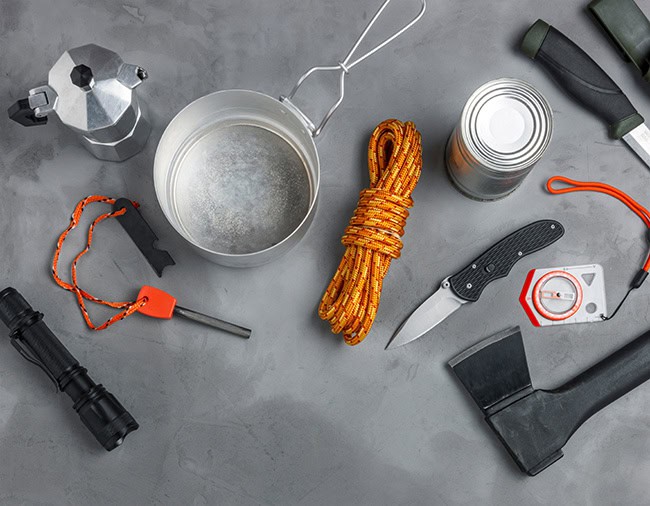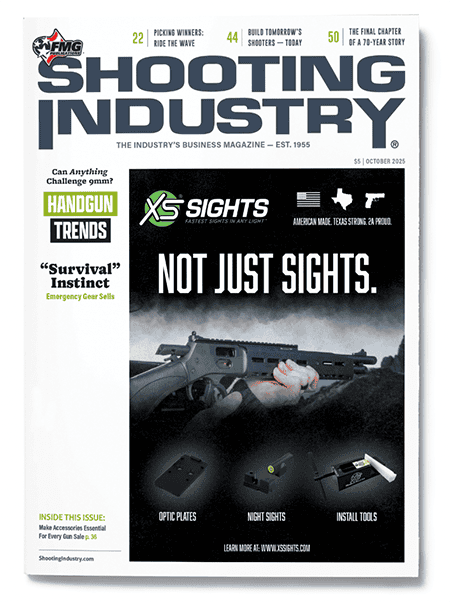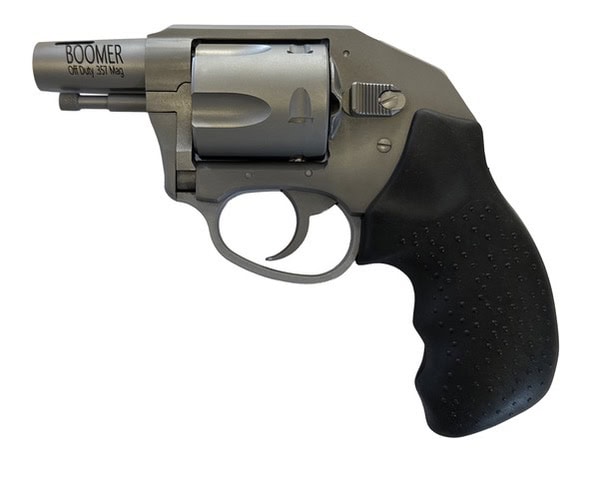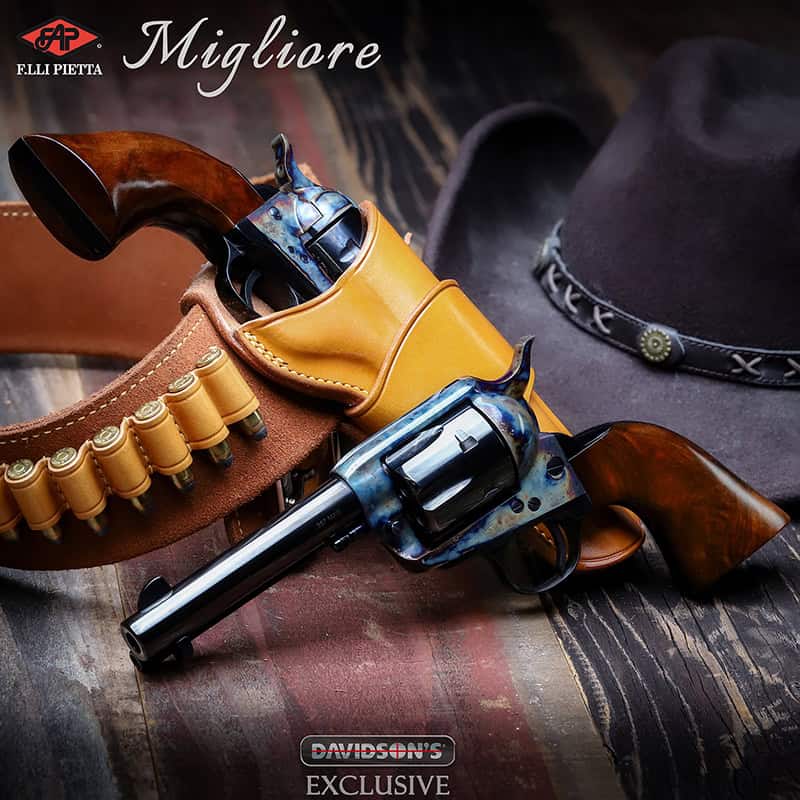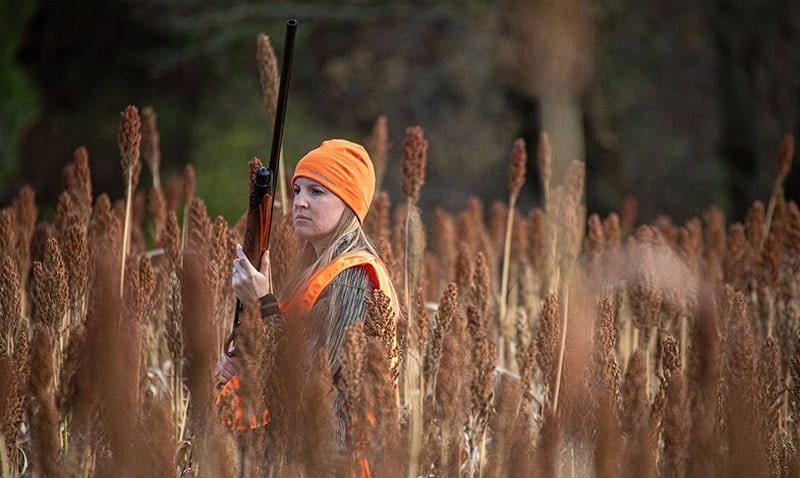Survival Instinct
Emergency Accessories Are Natural Attractions For Gun Buyers
Many firearms enthusiasts keep supplies for natural disasters, but the “prepper” stigma discourages many gun shops from carrying emergency, off-grid supplies.
People buy firearms largely to protect their families from situational threats like random assaults and home invasions, but they also want to protect themselves and their families from violence and predation during episodes of societal breakdown. The same customers also buy survival — or “prepper” — supplies when natural disasters knock out power and water.
These product lines are a compatible marriage, and retailers who position themselves as a one-stop shop for home defense and contingency preparation occupy a lucrative niche.
Hope For The Best, Prepare For The Worst
Nothing illustrates this marriage more succinctly than Prepper Gun Shop in Grand Forks, N.D. The name says it all.
Cameron Davis, general manager, said, “We’re trying to help customers make sure they are in control of any situation they encounter, from home invasion to natural disaster. It’s about making sure our customers are prepared for anything that can happen. We hope for the best, but we prepare for the worst.”
Prepper Gun Shop’s firearms inventory covers the first-time gun buyer to the most seasoned buyer.
“We try to keep the barriers to our business as low as possible,” Davis added. “We give a lot of encouragement. For the guy who’s been buying from us for years, we try to make sure he can get another gun, to an older woman looking to buy her first gun for self-defense.”
Dehydrated food and paracord are staples, but Davis noted he stocks supplies that have real-life applications for relevant situations in his community.
“Remember the train derailment in Ohio [East Palestine, Ohio, Feb. 3, 2023]?” Davis asked. “Having gas masks and people having the ability to get them so they and their family can breathe is huge. Personal protective equipment — gas masks, hazmat suits, gloves, those sorts of things — is important for people to have if they need them. It sounds like profiteering; this isn’t the goal. When things do ‘pop off,’ people come looking for this stuff.”
Fire-starting kits and power banks for smartphones and tablets are also necessary devices when the power goes out, Davis said.
“They’re making interesting combo items, things that will charge a phone but also have a spark igniter on top,” he shared.
Compact, multi-use items make it easier for customers to keep essential gear in a smaller footprint.
“We keep older tech, but newer tech will help people across a wider variety of applications instead of having backpacks full of everything they think they might need,” he continued.
According to Davis, the development of newer and better emergency equipment is staggering. It’s easy, he added, to “geek out” over new products.
“It’s incredible. I wish I could explain it,” he said. “I read new tech articles, watching what’s coming out. I’m a gun guy, but people are making a new solution to a problem every day. I’m trying to make sure the best solutions get out to the masses.”
The Biggest Challenge
As with guns and gun accessories, the challenge is maintaining an inventory of things that actually sell.
“You sometimes get stuck,” Davis acknowledged. “I had an older guy who taught me purchasing. He said you’re going to have misses. Sometimes you’re going to sit on a product. You have to be willing to take a loss or donate it. Take the loss and move on. The consumer is the only one who matters. If the consumer wants more, I should have bought more. If they don’t want it, I shouldn’t have bought any. It’s a delicate balance.”
Let’s examine dehydrated food a bit further. If the power goes out for a week or more, as it did in New Orleans after Hurricane Katrina, or in North Carolina after Hurricane Helene, refrigerated food spoils quickly. If you were unable or unwilling to evacuate a disaster area, a homeowner needs non-perishable food.
“Foods are still selling, but I don’t see massive spikes,” Davis informed. “It’s a constant stream of income. I mean, I’ve never called anyone who’s ordered these food supplies and asked them, ‘Did you eat it?’ Grand Forks is an extremely strong community. You don’t ask if all the stuff in the basement was used.”
Food packets needing only boiling water are popular, but they’re available in the camping sections of big-box retailers. Davis noted there is a constant demand for Meals Ready to Eat (MREs), which you can’t readily get at Academy Sports + Outdoors or Walmart.
“It’s a low-hanging fruit for folks getting started,” he pointed out. “We don’t have hurricanes in North Dakota, but we do have blizzards. You need food and water first. It’s a good place for people to get their feet wet in disaster preparedness.”
Outfitting Rural Pursuits
Umpqua, Ore., is another self-reliant community frequently inconvenienced by severe weather. It’s also an outdoors-centered community, which strongly influences prepper preferences.
Carlos Ortegon, owner of Umpqua Survival, said his business originated as strictly a prepper outlet, but he quickly realized there is considerable crossover among the prepper and gun-buying segments of the community.
“The original owner created the business back in 2000 (Y2K), back when everyone was worried the world was going to collapse,” Ortegon recalled. “It was just survival stuff. He went real hard into the prepper supplies. It was a totally different vibe. He was also an electrician. He had a lot of off-grid stuff for people.”
Ortegon’s product lines aren’t restricted to traditional prepper gadgets. The community’s recreational interests require emergency preparedness.
“We’re a rural area,” he observed. “Everybody around here goes on mountain drives. They’re into fishing, camping and hunting. You don’t have be a crazy prepper to be prepared for stuff you know is going to happen. I try to have the supplies people need if they break down on a mountain drive.”
First-aid supplies are in high demand, according to Ortegon, as are fire-starting supplies and compact stoves. Jetboil stoves are very popular among his customers. He even sells gold-panning supplies.
The Gulf Coast has hurricanes. The Upper Midwest has blizzards. The Northwest has wildfires. When families are displaced, they need equipment to mitigate the impact.
“When wildfires get big, people lean hard on extra supplies,” Ortegon said. “Dehydrated foods are popular. We sell a lot of fire-starting stuff, a lot of paracord, a lot of first aid supplies and Jetboil stoves. We sell a lot of fuel, and we sell a lot of knives. I try to make sure to have the supplies people want readily available.”
Water filters and purifiers are essential equipment when water supplies are disrupted, but they also enable hunters, backpackers and anglers to drink safely from streams and even questionable water sources. Sawyer is a ubiquitous brand that offers a versatile line of purifiers. MSR is also highly regarded. Sawyer is available almost everywhere, and high-quality filtration devices are available from REI, backpacker stores and online, but it’s important for a gun shop/prepper shop to have them, too.
“In an emergency, I need food and water first,” Ortegon said. “It’s a good place for people to step into disaster preparedness. People buy water purifiers when they first buy.”
Everybody sells knives, too, even home improvement stores and feed stores, but a person gearing up for emergencies is just as likely to buy a knife from a gun shop.
“Knives have been doing well for us the last year,” Davis said. “We sell a lot of automatic knives. Microtech comes to mind right off the bat. I appreciate brands like that because they cover your first knife purchase to an advanced purchase. I’ve watched some of these guys spend $600 on a knife.”
Know Your Market
Knowing the community eliminates a lot of the guesswork that results in unsold merchandise. Carrying common-sense emergency supplies represents a healthier, more profitable business.
“Because of the way the internet is, a gun store selling just guns can’t survive,” Ortegon said. “We try to bring other folks in who are not just gun people. Backpackers and first responders come in here. Everyone around here, if they’re not working class themselves, they come from the working class. We have lots of outdoorsy people. We have a lot of people in the lumber industry — loggers, log truck drivers and mill workers.”
The sheriff is one of the store’s regular customers. Ortegon counts two county commissioners and a couple of state representatives as regular customers, as well.
“We’re also a good place for law enforcement to come and feel like they’re not going to be judged,” Ortegon continued.
Guns are still the bread and butter for these stores, and gun buyers from such a diverse populace find plenty to like at Umpqua Survival, Ortegon noted.
“We have long guns, handguns, ARs, every gun you can think of,” Ortegon said. “We have ammunition, holsters and accessories. We have an AR building section. You can build an AR just off the parts we sell.”
It’s Not For Everyone
In some communities, however, the prepper strategy simply does not fit.
One example is Sunrise Outfitters in Searcy, Ark., a bedroom community for Little Rock. Jen Childers, operations manager, said life here is sedate, and the prepper community is not big enough to support this type of emphasis. If somebody wants emergency supplies, Childers says she orders it for them online.
“I don’t have a whole lot of customers wanting survival products,” Childers confirmed. “I carried survival food for a while, but it didn’t work well in this store. I had some of that stuff sit around for two or three years and didn’t move it. I have 2,000 firearms in stock, which is what people come in here for.”
Ditto for World Wide Weapons in Bryant, Ark., about five minutes west of Little Rock. This hard-core gun shop pitched for preppers for a time, but the store never established a prepper identity. A few tubs of dehydrated food in a far corner are all that remain of the effort.
Again, this strategy requires knowing the community and integrating a prepper identity into a retailer’s culture. It doesn’t always fit, but where it works, it works very well. Your customers will let you know quickly, in most cases.

